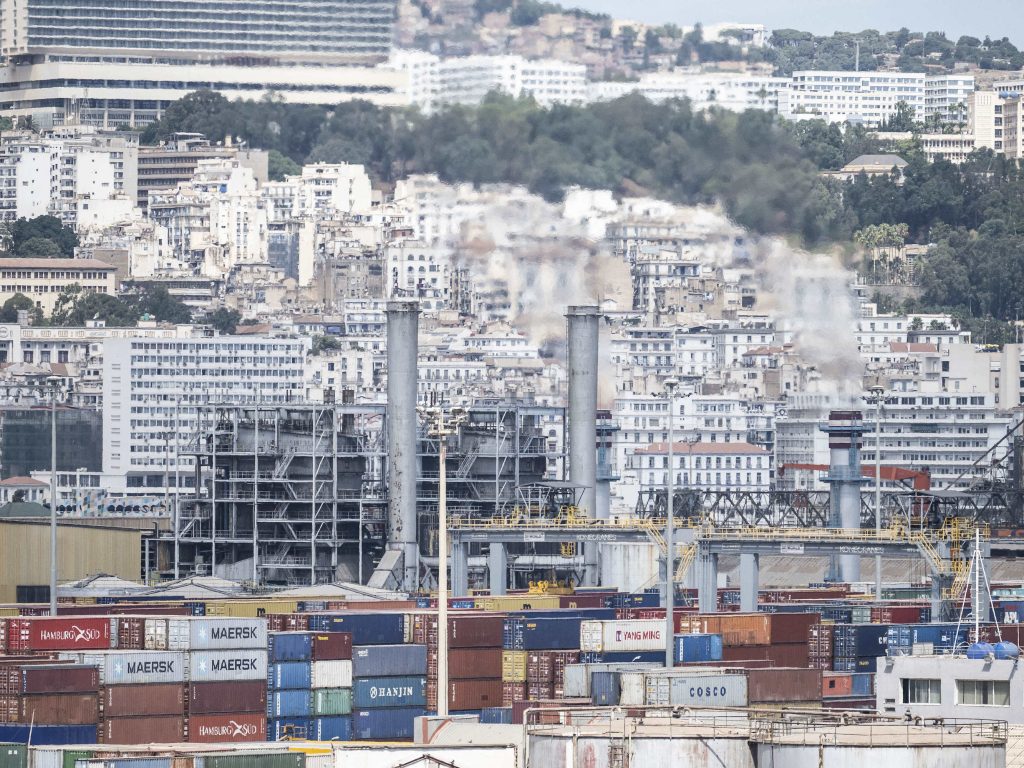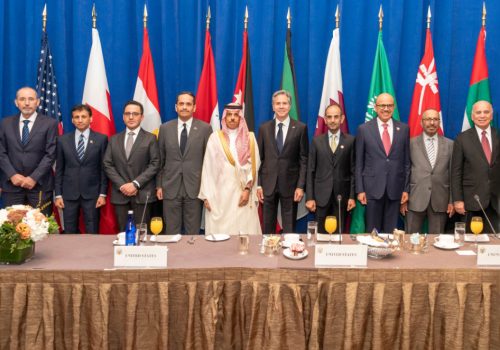In dire straits just a year ago, Algeria’s leaders show a new swagger today that might suggest the country has turned a corner. But when Algerians lament (as they often do) how little ever changes in their country, they do so for good reason: beneath today’s triumphal veneer, ominously familiar patterns swirl.
Last summer the nation was reeling. The economy had already contracted by five percent amid the onset of COVID-19, and in 2021, Algeria suffered its worst wave of the pandemic and severe wildfires across much of its populous north—twin challenges the government was unprepared to face. With the Maghreb region’s lowest vaccination rates and severe shortages of medical equipment, Algerians scrambled to collect oxygen, masks, and other essential supplies from abroad. Meanwhile, ordinary citizens and young army recruits—deployed without proper fire-fighting equipment—struggled in vain to beat back flames with tree branches. More than ninety citizens and soldiers died in the fires, triggering widespread outrage. Seeking scapegoats, authorities blamed religious fundamentalists, Amazigh (Berber) separatists, Israel, and Algeria’s neighbor Morocco—with which it promptly severed diplomatic relations. Unsurprisingly, these accusations did nothing to resolve Algeria’s list of domestic woes, which persisted in the following months amid spiraling prices and shortages of basic foods. With the dinar slumping and import bills rising, authorities prepared to increase taxes and pare back the country’s generous subsidy regime (which last year would cost the state $35 billion, or 23 percent of GDP).
By January 2022 the winds had shifted. Fears of a looming Russian invasion of Ukraine had pushed global energy prices to their highest levels in eight years. For Algeria, where oil and gas revenues have long accounted for around 95 percent of export earnings and half the state budget, this meant an influx of new resources. In mid-February, Algeria’s president, Abdelmadjid Tebboune, scrapped the planned tax increases and subsidy cuts, and instead announced new cash transfers to unemployed youth.
Missing the moment
But Russia’s invasion of Ukraine, also launched in February, has had downsides for Algeria. First, it put the country in a diplomatic bind as battle lines hardened between Russia and the West. (Algeria has close political and security ties to Russia and economic links with Europe.) Second, it caused precipitous price increases across global grain markets and cut short attempts by Algeria—the world’s sixth largest importer of wheat—to pivot from France to Russia as its primary wheat supplier. Higher bills for imported grain have been more than offset by Algeria’s windfall in hydrocarbon revenues, which authorities estimate will reach $50 billion this year. But today’s high commodity costs are driving up consumer goods prices, which are unlikely to revert to previous levels when energy prices inevitably do.
While the current good times would seem an ideal moment to prepare for that eventual reversal, Algeria’s leaders have a poor track record when it comes to such forward projection. In fact, prospects for reform in Algeria tend to ebb and flow in inverse relation to hydrocarbon revenue levels. Oil and gas booms have consistently silenced discussion of the very reforms that might prevent the next energy market downturn from leading Algeria into crisis—as has happened multiple times before. In the late 1980s, an oil price crash reduced the state’s ability to maintain high social welfare spending. Faced with escalating protests over subsidy cuts, the government announced a hasty, short-lived opening: Algeria’s first independent media, civic groups, and political parties were authorized, and open elections scheduled. But with a popular Islamist party poised to sweep the polls, the military interceded in 1992, suspending the electoral process and triggering a brutal war with extremist guerrillas that left an estimated 150,000 dead.
Abdelaziz Bouteflika was elected president in 1999 on promises to end the violence. Amid historically high oil and gas prices, he oversaw years of postwar reconstruction and prosperity—but no reforms to diversify Algeria’s economy away from hydrocarbons or liberalize its politics. When energy prices again crashed, in 2014, talk of economic reform surged. Spurning the more ambitious proposals, authorities instead oversaw an erratic series of domestic austerity measures and import bans. Alongside Bouteflika’s ailing health and the shameless opulence of a corrupt business elite, the resulting economic stagnation bred frustration and resentment. When authorities announced in February 2019 that Bouteflika would run for reelection that spring, Algerians rose up in a spontaneous, peaceful protest movement called the Hirak.
Stifled hopes
The Hirak forced Bouteflika’s resignation, but Algeria’s powerful military and security apparatus was determined to quash its calls for more profound change. After a months-long transition process, Tebboune, a longtime housing minister, was elected president in December 2019. Absent leaders or groups empowered to speak for the streets, protesters fell short of achieving their central demand to “get them all out”—aimed at the corrupt military and political elites who had ruled Algeria for decades, along with allied oligarchs. Since the Hirak began, those groups have suffered a substantial purge, in which army leaders have used the justice system to sideline adversaries on corruption charges, hoping to appease protesters without truly transforming the structure or exercise of power in Algeria.
At the same time, the army tasked Tebboune and other new leaders drawn from the ranks of the system with returning Algeria to its previous equilibrium after the back-to-back shocks of the Hirak and the pandemic. In Tebboune’s first two years in office, his administration pushed through a constitutional referendum—leaving intact the heavily centralized system protesters had risen up against—and elections for the national parliament and regional and local councils. In a sign of Algerians’ views of their political system, turnout for the polls set record lows. In the legislative polls, spoiled ballots—mostly representing deliberate protest votes—outnumbered votes for the top nine parties combined, including the two longtime ruling parties.
In February 2021, when Hirak protests resumed after nearly a year’s pause due to the pandemic, authorities successfully smothered the movement through large deployments of security forces and waves of arrests. Aiding them in this effort were a reinforced online surveillance apparatus, widespread abuse of pretrial detention (sometimes lasting over a year without trial), and penal code changes instated by Tebboune’s unilateral decree in May 2021, which allow authorities to charge citizens with terrorism merely for speaking critically of the government. Within weeks, Tebboune was confident enough in the state’s victory over the movement to cynically praise it as the “blessed Hirak” that “saved Algeria from a true catastrophe.”
Faced with such repression, and having long struggled to settle on concrete demands or representatives who might have sustained hope for change, today the Hirak is over but not forgotten. Algerians—especially the young masses who were the movement’s lifeblood—often speak of it with nostalgia. “The only time I felt alive was during the Hirak,” one young man told Le Monde earlier this year. Meanwhile, nearly 250 political prisoners remain jailed, and civic activists’ attempts to rekindle pressure for fundamental change have not yet succeeded.
Amid today’s hydrocarbon boom, reforms that authorities had been proposing just months ago have fallen by the wayside. These include measures as varied as electoral reform, revised car import rules, improved wildfire management plans, the long-awaited rollout of e-commerce, and replacement of Algeria’s blanket subsidy system with a targeted, need-based one. The scant changes enacted since February have satisfied few; the country’s leading independent business association critiqued a draft investment law as “opaque” and misguided but saw it passed anyway, while hasty plans to replace French with English as the primary foreign language taught to schoolchildren have left parents and teachers bewildered. Even as Europe clamors for green hydrogen and other renewable power supplies, Algeria is making only tepid efforts at energy transition. With the Hirak subdued and hydrocarbon prices booming, authorities are banking that these disappointments won’t matter—and that their refusal to initiate substantive economic, social, or political reforms won’t blow back on them as it has in the past.
Silent partners
Instead, Algeria’s leaders are basking in their newfound international esteem, a product of the country’s status as a major oil and gas producer in close proximity to Europe, which is desperate to replace energy imports from Russia. Prices for Algeria’s Saharan Blend oil, which had fallen below $20 per barrel in 2020 amid the initial shock of the pandemic, neared $130 in June. Algeria hosted the Mediterranean Games this summer and will welcome the next Arab League summit in November. A steady march of heads of state, foreign ministers, and other dignitaries have traveled to Algiers or invited their Algerian counterparts in recent months, courting the newly popular nation. While Algeria is struggling to rapidly increase oil and gas production after years of underinvestment and mismanagement, what supplies it does have are sufficing to attract substantial attention.
Regrettably, foreign powers’ desire to curry favor for scarce energy supplies means that Algerian reformists are largely on their own for now. (Given Algeria’s painful colonial history and long-standing isolation, distrust of outsiders is widespread and few activists seek foreign help anyway. But faced with such daunting odds, any support might be valuable.) Italy has succeeded in locking up spare Algerian energy capacity in part by staying silent on politics—in contrast to Morocco and Spain, whose diplomatic disputes with Algeria in the last year have cost them gas supplies and other trade. Other would-be partners are taking careful note, and will likely stay quiet on Algeria’s domestic troubles—just as Algeria’s leaders would prefer.
Meanwhile, Algiers has worked to maintain a delicate balancing act in its relations with ally Russia, including abstaining from a key United Nations vote and carefully offsetting official visits or commercial deals with Russia through comparable ones with Western nations. Less visibly, in the past year Algeria has also continued expanding its already deep ties with China, signing major new mining, military procurement, and oil exploration deals. The countries have swapped statements supporting one another’s foreign policy priorities, and Chinese officials have endorsed Algeria’s efforts to join the BRICS group. Amid lackluster interest from a Europe that is intent on pivoting to renewable energy, Algeria is reportedly courting China to finance the ambitious $13 billion Trans-Sahara Gas Pipeline it hopes will soon link its gas fields to Nigeria’s.
Few Algerian reformists were looking to Russia or China for help in defending free expression and human rights, or in diversifying the country’s economy away from volatile extractive industries; rather, the strong ties are reminders of Algeria’s preference for noncritical partners in its diplomatic and commercial relations. But ignoring critiques and failing to confront difficult realities has led Algeria into crisis before. While its leaders may be riding high today, their aversion to reform leaves Algeria vulnerable to repeating the mistakes of its past.
Andrew G. Farrand is a nonresident senior fellow with the Atlantic Council’s Rafik Hariri Center & Middle East programs. He is the author of The Algerian Dream: Youth and the Quest for Dignity.
Read more
Image: This picture taken on August 25, 2022 shows a general view of the Algerian capital and part of the harbour with gas tanks ahead of the arrival of French President in Algiers for an official visit. French President starts a three-day visit today to Algeria to help mend ties with the former French colony, which this year marks its 60th anniversary of independence. The first French president to be born after Algerian independence, Macron is hoping "to lay a foundation to rebuild and develop" a sometimes difficult relationship with the North African nation, his office said. Photo by Eliot Blondet/ABACAPRESS.COM

